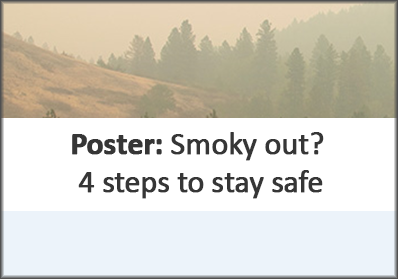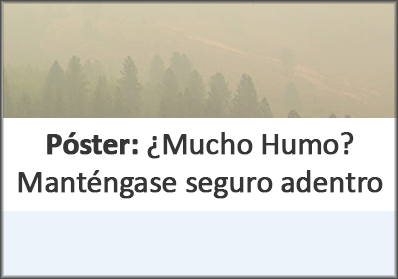Wildfire smoke preparedness
Be prepared to protect yourself and your family from wildfire smoke. Find posters, DIY filter videos, mask tips, health guidance for childcare providers, and more resources below.
Short URL: kingcounty.gov/wildfiresmoke
Stay safe indoors when it’s smoky out:
- Check air quality at AirNow.gov
- Stay indoors when AQI is 150+. Children under age 18, adults over age 65, people with asthma or respiratory and heart conditions, pregnant people, and others at higher risk from smoke should stay indoors when AQI is 100+.
- Watch for symptoms
- Improve indoor air
Read the sections below for more information.
Smoky out? 4 steps to stay safe
(English) (155 KB)
¿Mucho Humo? Manténgase seguro adentro
(Spanish) (158 KB)
One minute video: 3 tips to beat the wildfire smoke this summer.
2:40 video: How to stay safe during smoke season
Blog post: How to keep indoor air clean on smoky days
Protect your health on smoky days
Check the air quality forecast
Air quality conditions may change quickly. Go to Fire.AirNow.gov for the current smoke conditions in King County. Find a 5-day smoke forecast at wasmoke.blogspot.com. Pay attention to local news for air quality alerts and health warnings in your area.
You can sign up to receive emergency alerts by phone or email at kingcounty.gov/alert.
Who is more sensitive to wildfire smoke?

- Children and teens under age 18
- Anyone who is pregnant
- People with asthma or respiratory and heart conditions
- Adults over age 65
People in these groups, and also others at higher risk from smoke, should stay indoors when AQI is 100+.
Limit physical activity outdoors
Limit exercise and vigorous physical activity outdoors when smoke levels are “unhealthy for sensitive groups” or worse (101+ AQI). This includes physical labor, running, biking, and sports.
Schools, sports teams, and other organizations serving children should move indoors when smoke levels are “unhealthy for sensitive groups” or worse (101+ AQI). More information: Air Pollution and School Activity Guide.
Stay indoors as much as possible
Move indoors if you can, and keep the air inside air clean. You can visit a library, community center, mall, or check WA211 for a list of cooling centers.
If you can’t move indoors, an N95 mask offers good protection from wildfire smoke for most people.
Keep indoor air clean
- Close windows and doors as much as possible. If it becomes too hot, open the windows to cool down the space, or move to a mall, library, or other air-conditioned building.
- Use fans or an air conditioner (AC) when it's hot, if possible. Set your AC to recirculate.
- Use an air cleaner with a HEPA filter if possible. More information: EPA's Indoor Air Filtration Factsheet.
- A DIY air filter fan may be an easy and cost-effective way to clean air inside your home. Learn how to make a quick air filter with a box fan, a MERV-13 filter and duct tape: Public Health Crafter's Corner: 1-minute DIY Filter Fan, Public Health Insider
- Make a "clean air room" in your home: Learn how to keep indoor air clean on smoky days, Public Health Insider. Tips for clean air on smoky days: A Public Health comic, Public Health Insider.
- Don't smoke, use candles, or vacuum – these activities pollute indoor air. Avoid frying and broiling when cooking indoors.
Watch for symptoms of smoke exposure
Move someone inside if they have a headache, sore throat, cough, burning or watery eyes, dizziness, or wheezing. If you have asthma or another respiratory or heart condition, keep inhalers and medications ready and make a plan with your healthcare provider.
Call 911 if someone has shortness of breath or chest pain. You can also send a text to 911 if you are deaf, hard of hearing, or speech impaired. Learn more about text-to-911.
Make plans for indoor activities for kids on smoky days
Consider what your children can do if they need to stay indoors when smoke levels are "unhealthy for sensitive groups" or worse. Some examples: dance party, karaoke, board games and puzzles, making friendship bracelets, obstacle course, indoor cornhole tournament, and movies.
Schools, camps, sports teams, and daycare providers should make plans for smoky days
Plan to postpone outdoor activities or move them indoors when smoke levels are "unhealthy for sensitive groups" or worse (100+ AQI). Read the Air Pollution and School Activity Guide (Washington State Department of Health) for guidelines.
Masks and wildfire smoke
N95 respirators and KN95 masks offer good protection for most people, when worn tightly and correctly. Read Masks and Wildfire Smoke (83 kb) for more information. Cloth masks don't provide much protection from the small particles in wildfire smoke.
If you have a pre-existing condition that might make you more sensitive to smoke, consult your medical provider.
Downloadable materials
Key resources
- Public Health Wildfire Smoke Response. Includes recommendations for public events, sports, and other outdoor activities at different Air Quality Index levels.
- Health and wildfire smoke
WA State Dept. of Health - Air quality monitoring
Puget Sound Clean Air Agency - Air Now
Environmental Protection Agency - Wildfire Smoke Blog
- A video on how to properly wear an N-95 mask
- Wildfire smoke preparedness during COVID-19

 Translate
Translate

